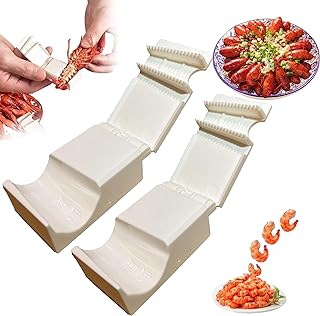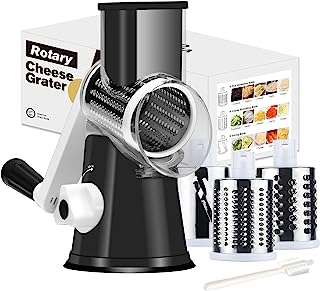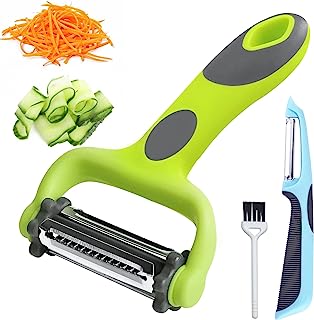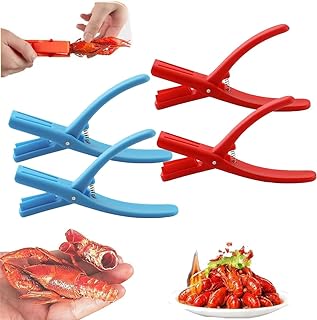5 important factors worth considering when looking for the best cheese grater
Investing in the right kitchen tools can greatly improve your cooking experience. A cheese grater is a must-have gadget that can make a big difference in your routine. While choosing a cheese grater may seem unimportant, it actually plays a big role in the final taste of your dishes. It’s important to consider factors like design, functionality, material, and ease of cleaning when selecting a cheese grater that fits your cooking style and helps you create delicious meals.
See our guide to the best cheese grater.
Type of grater (box, rotary, handheld)
When choosing a cheese grater, it can make a big difference in how much you enjoy cooking. Box graters are a classic choice, offering different grate sizes and a strong build. They are a reliable tool in any kitchen. On the other hand, rotary graters make grating easier with a spinning drum that requires less effort. Handheld graters are great for quick tasks and small amounts of cheese, as they are easy to store and carry. It’s important to think about your cooking style and preferences when picking a grater that fits your needs.
Box graters offer versatility, while rotary graters are more efficient for simple grating. Handheld graters are perfect for those who want a basic and easy-to-use tool in the kitchen. Each grater has its advantages, catering to different cooking styles. The best choice depends on what you personally prefer and how often you’ll use it. By considering your options and thinking about how you cook, you can choose the right grater to improve your cooking experience.
Material (stainless steel, plastic)
When choosing a cheese grater, the material it’s made from is important for how well it works and how long it lasts. Stainless steel graters are durable and resist rust, making them a popular choice. They provide a strong surface for grating cheese efficiently and won’t corrode over time. On the other hand, plastic graters are lighter and cheaper, but they might not be as durable as stainless steel ones. While plastic graters can work well for occasional use, they might not hold up as well for heavy grating tasks.
When deciding between stainless steel and plastic cheese graters, think about how often you’ll use it. If you grate cheese a lot, a stainless steel grater might be worth the investment. Stainless steel graters are strong and can handle regular use for years. However, if you want a cheaper option or only plan to use the grater once in a while, a plastic grater can still get the job done. Your choice between stainless steel and plastic cheese graters depends on your needs, budget, and how often you’ll be using it in your kitchen.
Size and weight
When you’re thinking about buying a cheese grater, it’s important to consider its size and weight. Some people prefer smaller, lighter graters because they’re easier to handle and store, especially if you have limited space or weak hands. However, larger and more solid graters can provide stability and precision while grating, giving you consistent results without slipping. The weight of the grater can also show how durable and high-quality it is, with heavier graters often lasting longer with frequent use.
The size and weight of a cheese grater can affect how well it works. A heavier grater can make grating hard cheeses or vegetables easier because it exerts more pressure. A lighter grater is easier to maneuver and is good for quick tasks. Think about how much you cook and what you usually grate when choosing a cheese grater. If you need to grate a lot or need fine results, a larger, heavier grater might be the best option for versatility and consistency. It’s important to find the right balance between size, weight, and how well the grater works to make sure it’s a dependable kitchen tool for a long time.
Blade sharpness
When you’re thinking about buying a cheese grater, it’s important to consider how sharp the blades are. Sharp blades make grating cheese easy and efficient, and they also affect the texture and quality of the cheese. They slice through the cheese smoothly, creating neat, even shreds that make your dishes look and taste better. Getting a cheese grater with sharp blades is like enhancing your cooking experience, improving both the final result and the process of preparing food.
On the other hand, a dull blade can make grating cheese a difficult and annoying task. Dull blades require more effort to use and can squash or tear the cheese, leading to uneven sizes and textures. This can make your dishes look and feel less appealing, making the dining experience less enjoyable. By focusing on blade sharpness when choosing a cheese grater, you’re not just picking a kitchen tool; you’re choosing to make your cooking more precise and flavorful.
Cleaning and maintenance requirements
When choosing a cheese grater, it’s important to think about how easy it is to clean and maintain so it lasts a long time and works well. If you pick a cheese grater that’s easy to clean, it can save you time and effort in the future. Stainless steel graters are a good choice because they’re durable and simple to clean by hand or in the dishwasher without rusting. Getting a high-quality cheese grater with removable parts or a nice design can also make cleaning easier, so you can enjoy freshly grated cheese without dealing with tough residue or smells. Thinking about cleaning and maintenance when picking a cheese grater can make cooking more enjoyable and ensure your kitchen tools stay in great shape for a long time.
Conclusion
When it comes to kitchen tools, the cheese grater is a classic must-have that enhances our cooking experiences. It can add flavor to our meals and represents tradition and skill. Whether we’re shredding mozzarella for pizza or grating Parmesan over pasta, the cheese grater is always there to help us in the kitchen. As we try new food trends and inventions, the cheese grater reminds us of the joy of making tasty homemade meals. Want more info on leotard, check the best leotard.



